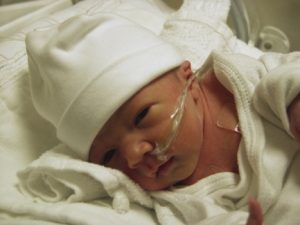This course will focus on the cardiopulmonary implications for the premature or medically-complex infant as related to physiological stability, evolving motor control, sensory stability, and transition to oral motor skills that support feeding. It will focus on advancing the critical reasoning skills of the neonatal therapist to support the infant’s ability to obtain foundational motor and sensory skills. These skills include the ability of the infant to cough, produce audible phonation, oral motor skills, swallow skills, trunk facilitation, gestational age appropriate positioning/handling to support the emergence of gross motor skills for postural stability. You will learn movement analysis skills (via lab time and video presentations) to assess breathing patterns, facilitation techniques to support trunk development, positioning strategies to support chest wall development, and feeding techniques to maximize postural control. We will discuss current literature as relevant to this topic and apply a systems theory approach for case study treatment planning.
Course Objectives:
Upon completion of this course, participants will be able to do:
- Discuss anatomical and kinesiological developmental changes for the newborn chest wall
- Discuss affects of prematurity and cardiopulmonary co-morbidities on chest wall development
- Integrate chest wall movement assessment and treatment strategies to maximize infant outcomes
- Design developmental positioning and handling interventions to reduce chest wall deformities
- Incorporate postural support with positioning and handling of infants for improved chest wall mobility during oral feeding
- Integrate a systems approach to individualized care plan for the infant with cardiopulmonary compromise
Holly Schifsky, OTR/L, CNT, NTMTC, CBIS, has worked in pediatrics for the past 28 years with the past 17 years in a level IV NICU. She is a Certified Neonatal Therapist, Certified Neonatal Touch and Massage Therapist, Certified Brain Injury therapist, a member of National Association of Neonatal Therapists, and has completed 6-month mentorship in infant/child NDT.
She has worked within the NICU and NICU follow-up clinic to maximize patient and family outcomes for the most complex premature and medically-fragile term infants. Holly received her BS in OT from the University of North Dakota. She is a faculty member for the Neonatal Touch and Massage certification; and Manuel Edema Mobilization training. She is the recipient of the National Association of Neonatal Therapists Clinical Excellence award in 2018, due to her clinical expertise and dedication to advancing the therapeutic interventions for NICU infants with cardiopulmonary conditions.
Financial Disclosure: Holly Schifsky receives an honorarium from Education Resources, Inc.
Non-Financial Disclosure: Holly Schifsky has no relevant non-financial relationships to disclose.
"I cannot say enough of how helpful this information is. Holly is brilliant and I look forward to reviewing information presented and putting into practice." -i_cannot_say_enough_of_how_helpful_this_information_is__holly_is_brilliant_and_i_look_forward_to_reviewing_information_presented_and_putting_into_practice
"WOW! Holly was very knowledgeable and did a great job speaking and explaining. Good videos and hands on." -wow_holly_was_very_knowledgeable_and_did_a_great_job_speaking_and_explaining__good_videos_and_hands_on
"If there were a higher rating than Excellent, I would give it to Holly. I valued the content and the manner in which her competence and character shined through the whole presentation. Thank you." -if_there_were_a_higher_rating_than_excellent_i_would_give_it_to_holly__i_valued_the_content_and_the_manner_in_which_her_competence_and_character_shined_through_the_whole_presentation__thank_you
VENUE ADDRESS
Methodist Hospital - San Antonio
4450 Medical Drive
Suite 3131
San Antonio, TX 78229
Directions
SUGGESTED ACCOMMODATION
Omni Hotel - San Antonio
9821 Colonnade Blvd.
San Antonio, TX 78230
Directions
VENUE LOCATION MAP
Click image to access Google Maps.
This course meets the criteria for 14.5 contact hours (1.45 CEUs).
ASHA CEUs are awarded by the ASHA CE Registry upon receipt of the CEU Participant Form from the ASHA Approved CE Provider for 1.45 CEUs.
This program has been submitted for approval for 14.5 clock hours of continuing education credit by the TX Speech Language Hearing Association (TSHA).
This activity provided by the Texas Board of PT Examiners accredited provider Approval #1910017TX for 14.5 CCU's and meets continuing competence requirements for PTs and PTAs licensure renewal in Texas.
Participant's License Number _____
Approved provider of continuing education by the American Occupational Therapy Association #3043 for 14.5 contact hours (1.45 CEU's) Intermediate level. Occupational Therapy Process: Assessment, Intervention. The assignment of AOTA CEUs does not imply endorsement of specific course content, products or clinical procedures by AOTA.
Approved by the TX Board of OT Examiners.
NBCOT professional development provider-14.5 PDUs .
This course meets the criteria for 14.5 hours towards Neonatal Therapy Certification.



